Top 6 Organic & Non-Toxic Weed Killers For A Healthy Yard
Keep your yard and garden weed free with organic and non-toxic weed killer. Conventional weed killer contains harmful chemicals that you don’t want in your backyard. Kid-safe, pet-safe and bee-friendly organic weed killer is the best way to keep your lawn and garden healthy while getting rid of unwanted weeds. It’s easier on the environment too!
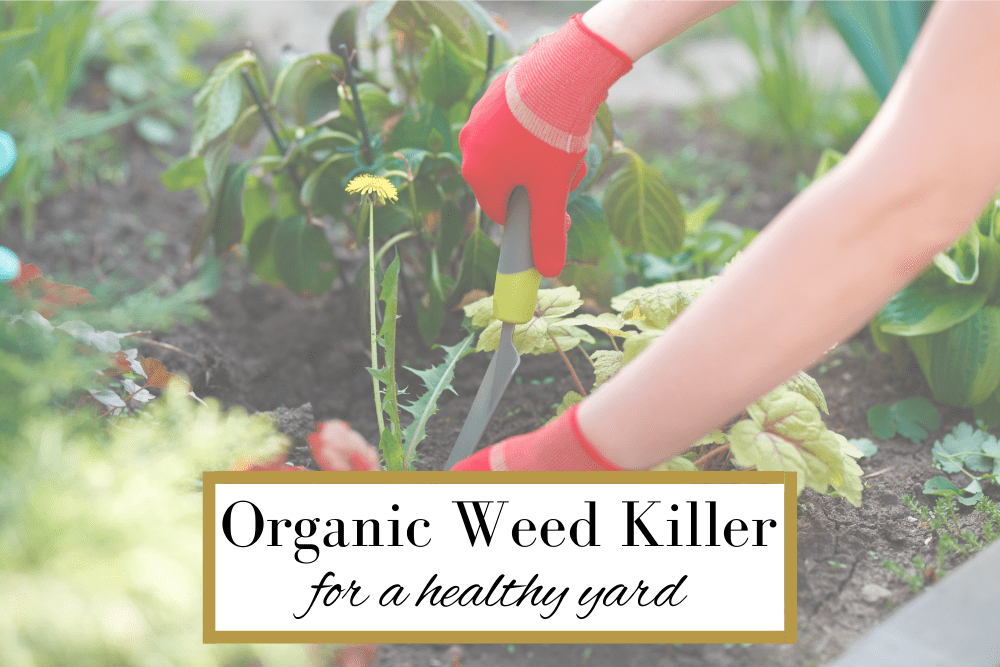
Disclosure: This post contains affiliate links, which means if you make a purchase through these links, we may receive a small commission at no extra cost to you.
If weeds are plaguing your yard, garden beds and driveway cracks, removing them can feel like a full-time job. Weeds hijack nutrients from the soil and crowd out the plants that you actually want in your yard and garden. Although conventional weed killer will work to destroy your weeds, you’ll also be depositing harmful chemicals all around your yard and garden.
Stop weeds from overtaking your yard with organic and non-toxic weed killer. Kid-safe, pet-safe and bee-friendly weed killer is the best way to keep your lawn and garden healthy while getting rid of unwanted weeds. It’s easier on the environment too!
Most organic weed killers are non-selective, meaning they will kill most forms of vegetation, not just the weeds. Be mindful of this with spraying near your prized plants, garden vegetables and grassy green lawn.
Selective weed killer will target broadleaf weeds, like chickweed and clover, but won’t damage your lawn.
How Do Weed Killers Work?
Pre-emergent weed killer: This type of weed killer prevents seeds from sprouting. Pre-emergent weed killer works best if applied in the late winter/early spring before seeds germinate. Pre-emergent weed killer may need to be applied several times a season. Apply only to areas where you don’t want anything to grow, since this weed killer will prevent any seeds, not just noxious weed seeds, from emerging.
Post-emergent weed killer: This type of weed killer works on weeds that have already sprouted and are growing. Apply this weed killer to newly emerging weeds for best results. Weeds that have been growing for a while may be harder to treat and will require several applications.
Look below for our top 6 favorite organic and non-toxic weed killer brands to keep your yard and garden weed free!

- Key Features: Non-selective weed and grass killer. OMRI listed for organic use.
- From the Nature’s Avenger website: Avenger Weed Killer is an excellent alternative to synthetic, toxic herbicides. Using a natural citrus oil base, this is a non-selective herbicide that eliminates broadleaf, crab grass and other unwanted weeds naturally and quickly. Its main ingredient is d-Limonene. The patented formula works faster than the other leading, killing weeds while being safe to children, animals, and the water supply. When Avenger Weed Killer is applied to weeds, it strips off the plant’s waxy cuticle, and dehydrates the weed, killing it down to the root. Results are seen within hours. Weeds with a deep root system may require a second treatment or a stronger concentration.
- Active Ingredients: d-Limonene (citrus oil), Castor Oil
- Sizes: 24 oz spray, 32 oz concentrate, 1 gallon concentrate, 2.5 gallon concentrate
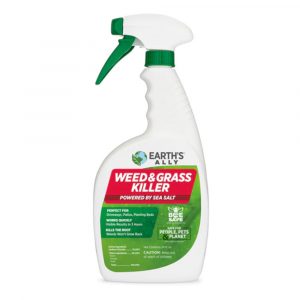
Earth’s Ally Weed & Grass Killer
- Key Features: Non-selective weed and grass killer. Proven bee safe.
- From the Earth’s Ally website: Powered by sea salt, the Earth’s Ally formula quickly kills common weeds to the root and offers a safer alternative to harsh synthetic chemicals like glyphosate, when used as directed. Earth’s Ally kills common weeds, including broadleaf, crabgrass, dandelion, clover, ivy, chickweed and many more. It is less effective on weeds with woody stems, such as some ivies. When used as directed, Earth’s Ally delivers visible results in 3 hours and has been proven to kill weeds to the root, so you won’t end up treating the same weed repeatedly. Safe for people, pets and planet when used as directed.
- Active Ingredients: Sodium Chloride (10.00%) Inert Ingredients: Water, Vinegar, Soap (90.00%)
- Sizes: 24 fl. oz. ready-to-use, 1 gal. ready-to-use

- Key Features: Non-selective weed and grass killer. OMRI listed for organic use.
- From the Sunday website: When it comes to stopping weeds, Sunday Weed Warrior stands above the rest! Our OMRI-listed herbicidal soap attacks both weeds and grasses, dehydrating them on the spot. Just point, shoot, and spray and see results in 20 minutes! Kills grass, weeds, algae, and moss. It controls annual bluegrass, chickweed, corn spurry, dandelion, groundsel, lamb’s-quarters, large crabgrass, mouse-eared chickweed, mustards, plantain, redroot pigweed, round leaved mallow, sheep sorrel, shepherd’s-purse, stinkweed, thistle, moss, algae, and lichens.
- Active Ingredient: Ammoniated soap of fatty acids
- Sizes: Sunday Weed Warrior Starter Pack, Sunday Weed Warrior Concentrate Refill
- Dandelion Removal: Sunday Dandelion Doom Starter Kit is a selective weed control product that is safe to use on your lawn.
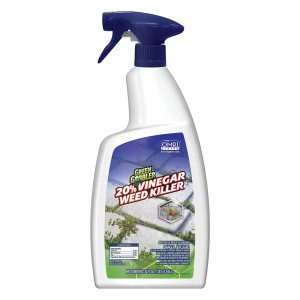
- Key Features: Non-selective weed and grass killer. OMRI listed for organic use.
- From the Green Gobbler website: Green Gobbler’s 20% Vinegar Weed Killer can be used to kill all types of weeds, including dandelions, crabgrass, and other annual and perennial weeds. It is derived from corn and is biodegradable. Green Gobbler is free of sulphates, bleach, dyes or chloride and does NOT contain glyphosate.
- Active Ingredient: 20% vinegar
- Sizes: 32 oz spray, 1 gallon, 5 gallon pail
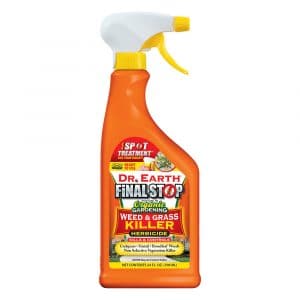
- Key Features: Non-selective weed and grass killer. OMRI Listed for use in organic gardening.
- From the Dr. Earth website: Final Stop® Weed & Grass Herbicide Killer Spray is an herbicide that produces remarkable results, because all of the ingredients are formulated to perform different tasks and functions synergistically, in a controlled fashion. The unique combination of natural ingredients works to kill immediately. Glyphosate free, non-selective herbicide weed & grass killer that kills naturally using essential oils. Made in the USA from the highest quality ingredients. No synthetic ingredients. Dr. Earth Weed Killer may be used up to the day of harvest.
- Active Ingredients: Essential oils
- Sizes: 24 ounce spray, 1 gallon spray
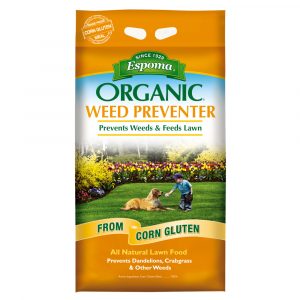
- Key Features: Selective weed killer, organic.
- From the Espoma website: Espoma Organic Weed Preventer prevents dandelions, crabgrass and other common weeds from growing. It provides long lasting greening that won’t burn. Children and pets can play on lawn immediately after application. Made from 100% corn gluten meal. For use on established lawns. Do NOT use when seeding a new lawn or over-seeding. Weeds Controlled: Black medic, black nightshade, buckhorn plantain, catchweed bedstraw, common lambsquaters, curly dock, dandelion, purslane, redroot pigweed, velvetleaf, annual bluegrass, barnyard grass, giant foxtail, green foxtail, large crabgrass, orchardgrass, quackgrass, shattercane, smooth crabgrass, wolly cupgrass, and yellow foxtail.
- Active Ingredient: 100% corn gluten meal
- Sizes: 6 and 25 pound bags
Tips For Using Organic Weed Killer
- Read the safety precautions on the product you use and protect yourself with gloves, protective eyewear, a respirator-type mask and long pants/long-sleeved shirt.
- Check the weather before spraying- don’t spray on a windy day.
- Treat weeds with organic weed killer when the plants are young (two to five leaves) for best results.
- Mature weeds with established roots will most likely need 2 or more treatments with organic weed killer.
- Spray the entire plant, from roots to stem to leaves, with organic weed killer for best results.
Ingredients To Avoid
- Glyphosate- Glyphosate is the active ingredient in Roundup. After analyzing data from over 30,000 farmers, a 2019 study in the International Journal of Epidemiology found an association between glyphosate exposure and lymphoma. Another 2019 study published in Mutation Research found a “compelling link” between glyphosate exposure and lymphoma.
- Carbaryl– Along with lowering the number of mosquitos in your yard, Carbaryl also kills honey bees.
- 2,4-D– 2,4-D is one of the two main ingredients that make up Agent Orange. It is both an endocrine disruptor and a possible carcinogen.
- Bifenthrin– Bifenthrin is an insecticide. It is also an endocrine disruptor.
Ingredients To Look For In Organic & Non-Toxic Weed Killer
Some of these ingredients in organic weed killer sound like you’re making a salad, but in reality the ingredients used in organic weed killer are a much stronger concentration than what you’d find in your pantry.
- Vinegar- 10-20% acetic acid
- Salt (aka sodium chloride)- avoid using salt on your lawn or garden bed since it can seep into the soil.
- Essential oils- Some examples are cinnamon oil, clove oil and orange oil (D-limonene)
- Soap- Ammonium nonanoate (ammonium soap and salt) is one type of soap used as an organic weed killer.
- Citric acid
More Backyard & Organic Garden Inspiration


